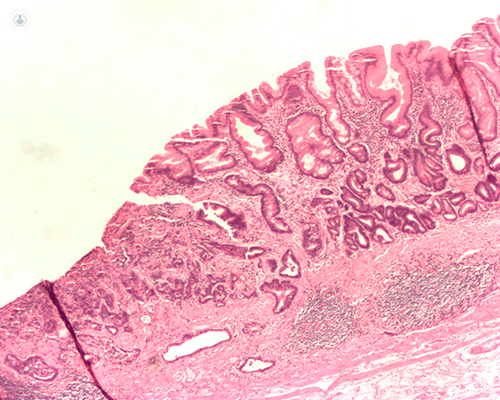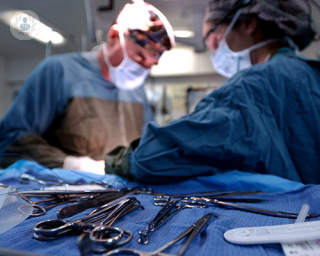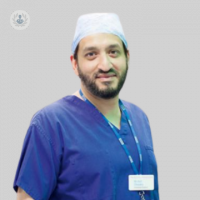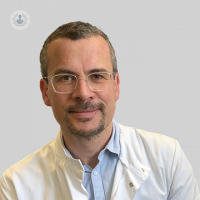Stomach cancer
Professor Hendrik Tobias Arkenau - Medical oncology
Created on: 03-31-2015
Updated on: 10-12-2023
Edited by: Carlota Pano
What is stomach cancer?
Stomach cancer, also known as gastric cancer, is cancer that develops in the stomach or the stomach lining. There are different types of stomach cancer, including:
- Adenocarcinomas: Stomach cancer that develops in the gland in the inner lining of the stomach. Sometimes, it can also start at the junction of the gullet and the stomach, called gastroesophageal cancer (GOJ-cancers). Most stomach cancers are adenocarcinomas.
- Lymphoma of the stomach: Cancer develops in the lymphatic tissue (the tissue that drains infection-fighting fluids).
- Gastrointestinal stromal tumours (GISTs): These form in the muscle of connective tissue of the stomach wall.
- Neuroendocrine tumours (like carcinoids): Cancer forms in the nerve and the hormone-making cells of the stomach.
Stomach cancer is also divided into stages which identify the size and the metastasis (the spread) of the cancer, helping to determine treatment. According to the number staging system, the different stages are:
- Stage 0: There are severe abnormal cells in the stomach's inner lining, but there is very little risk of them metastasizing to other parts of the stomach. This stage is also called high grade dysplasia.
- Stage 1: The cancer hasn't metastasized beyond the muscle in the stomach wall.
- Stage 2: The cancer has metastasized to the inner, supportive, muscle and outer layer of the stomach. It has also grown into nearby lymph nodes.
- Stage 3: The cancer has spread through and beyond the inner, supportive, muscle and outer layer of the stomach. It has also grown into the lymph nodes.
- Stage 4: The cancer is advanced and has spread into lymph nodes, tissues, body structures and distant organs.

Prognosis of stomach cancer
Depending on your age, overall health and the stage of your cancer, your outlook will differ.
Approximately 40 per cent of people with stomach cancer will survive one year after diagnosis; 20 per cent will survive at least five years after diagnosis and 15 per cent will survive for at least 10 years after diagnosis. In the UK, approximately 5,000 people die from stomach cancer each year.
Symptoms of stomach cancer
Initial symptoms of stomach cancer can include:
- Persistent indigestion
- Trapped wind
- Feeling bloated after meals and early satiety
- Stomach pain
- Dysphagia
- Acid reflux or heartburn
- Weight loss
Advanced cancers, which have metastasized to other organs and tissues in the body, may have the following symptoms:
- Blood in the stool or very dark, black coloured stools
- Weight loss
- Loss of appetite
- Severe pain in the upper abdomen
- Tiredness
- Nausea and vomiting
- Gastrointestinal bleeding
Medical tests to diagnose stomach cancer
If any of the above symptoms are experienced persistently, see a doctor as soon as possible. If your GP suspects stomach cancer, you will be referred to a specialist (gastroenterologist) for further tests.
The following diagnostic measures may be used to diagnose stomach cancer:
- Blood test
- Stool test
- Endoscopy to check for stomach ulcers or signs of cancer. A biopsy will be taken afterwards, for further testing.
- Endoscopic ultrasound which can help confirm the stage of cancer.
- CT scan
- Laparoscopy surgery to provide a more detailed analysis of the abdomen
- Barium swallow X-ray
Stomach cancer has the risk of going undetected for a long time, because early-stage symptoms are usually vague, showing no warning signs of the condition. Many people will have symptoms, but these may be due to, or mistaken for, other gastrointestinal conditions such as gastroesophageal reflux disease. In some occasions, symptoms may not appear until later, in developed stages of the cancer.
What are the causes of stomach cancer?
We are not sure exactly why the cells of the stomach change and become cancerous, but there are certain risk factors that can increase your risk for developing stomach cancer. These include:
- Being aged 55 years of older
- Being male – men are twice as likely to develop stomach cancer
- Smoking
- Having H.(helicobacter) pylori infection
- Eating a diet low in fibre, fruit and vegetables
- Eating a diet with lots of pickles and salted or smoked meats.
- Family history – you are more likely to develop stomach cancer if a close relative has had the condition
- Having stomach ulcers
- Having another type of cancer
- Being overweight
- Drinking large quantities of alcohol
- Having pernicious anaemia
- Inherited genes (CDH1, Lynch Syndrome among others)
Can stomach cancer be prevented?
Stomach cancer cannot be prevented, however, by controlling some of the above risk factors where possible, you will be less likely to develop this condition. In cases of known inherited genes (i.e. CDH1, Lynch Syndrome), early and regular surveillance (monitoring) through a specialist (gastroenterologist) should be adopted to avoid development of gastric adenoma and cancer.
Treatments for stomach cancer
Treatment options will depend on your overall health and the stage of the stomach cancer. The primary treatments for stomach cancer are surgery +/- chemotherapy/immunotherapy. Sometimes, radiotherapy and targeted therapy.
Depending on the stage of stomach cancer, multiple approaches may be used.
In early (resectable) stomach cancer, an approach of chemotherapy prior (neoadjuvant) to surgery followed by more chemotherapy (adjuvant), is adopted.
In patients with cancer that is advanced or has spread to other organs, chemotherapy +/- immunotherapy or targeted therapy is used. Patients are eligible for immunotherapy if their tumour expresses or is positive for a certain marker called PDL-1. Targeted therapy can be added if the tumour is HER-2 positive.
Using high energy radiation rays, radiotherapy is given as a series of short, daily treatments to kill cancer cells and avoid harm to healthy cells. It may also be given to help treat symptoms of advanced stomach cancer, such as gastrointestinal bleeding, and for relief pain.
Common gastroenterology/surgical procedures for stomach cancer include:
- Endoscopic mucosal resection or endoscopic submucosal dissection: By passing a thin snare through an endoscope, these two procedures remove small early-stage tumours that line the stomach lining, cutting the cancer away.
- Subtotal gastrectomy: Part of the stomach affected by cancer and part of the healthy organs around the stomach are removed. This procedure is a recommended option for patients with cancer that is located near the small intestine.
- Total gastrectomy: The entire stomach and part of the surrounding tissue are removed, often recommended for patients with cancer that is located in the body of the stomach or in the gastroesophageal junction. The oesophagus is then directly connected to the small intestine, allowing food to move through the digestive system.
- Lymph node removal: Lymph nodes in the abdomen are removed to be tested for cancer.
Most stomach cancer surgery patients will usually stay in hospital for three to 10 days, depending on the type of stomach surgery, your age and your overall medical condition. Afterwards, you may need between three to six months to fully recover from a gastrectomy.
The aim of treatment is to remove the cancer, either surgically or through conservative treatments.
If a tumour cannot be removed then treatment will aim to slow down its growth or to help improve its symptoms, such as surgery to treat a stomach blockage, which will help food to pass through the stomach more easily.
After stomach cancer treatment, you will be closely monitored every three to six months by your doctor through follow-up appointments. These visits will include a physical examination, a symptom review, a lab test and imaging tests to look for signs of the stomach cancer coming back, side effects of cancer treatments and new developments in your condition. It is very important that you go to all of your appointments.
Does stomach cancer spread quickly?
For the most part, stomach cancer is usually slow-growing, taking years to develop. Starting in the stomach lining, the most frequent place for stomach cancer to metastasize to is the liver. Besides the liver, it can also spread to the lungs, the lymph nodes or the tissue that lines the abdominal cavity, leading to peritoneum.
When is stomach cancer inoperable?
Stomach cancer may become inoperable (unresectable) if it invades delicate or important structures around the stomach, such as blood vessels; if it has spread too far over your body; if you are not fit to undergo surgery.
What type of specialist treats stomach cancer?
A multi-disciplinary team will treat stomach cancer, made up of gastroenterologists, surgeons, pathologists, medical and clinical oncologists.
What questions should I ask when I see my specialist?
You should ask the following questions:
- What stage is the cancer?
- What are the treatment options specific in my case?
- What treatments are included, and at what time point?
- Have all molecular makers been tested - should my tumour be molecularly profiled?
- Do I need to see a clinical geneticist (particularly for patients under the age of 50 and patients with a strong cancer history in the family)?
- Should I seek advice from a dietician (in particular for patients with significant weight loss)?














